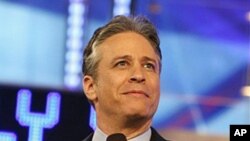With the U.S. midterm elections less than a week away, many comedians are getting involved in the political process. Two of the nation's best-known comics are organizing a political rally this weekend on the National Mall in Washington. But not everyone thinks it is a laughing matter.
Standup comic Lewis Black has drawn a sellout crowd at Washington's Warner Theater.
And at least one person in the audience thinks very highly of him.
AUDIENCE MEMBER: "Black for President!"
BLACK: "No, I do not want to run for president. I do not want to live here."
Lewis Black has gained popularity by his regular appearances on a mock TV news program called The Daily Show with Jon Stewart.
Stewart's show ridicules politicians and the media and is a huge hit.
Black's segment on the program is called "Back in Black."
The comic says he uses it to expose dishonest politicians.
"I think you constantly have to remind people that these idiots are not wearing clothes [are telling lies]," he said.
Black's comedic character is angry and perplexed by politics and the way it is portrayed on television news.
"Seriously, what kind of idiot just walks into the school and says, 'I am totally unqualified!'"'
"I represent on stage someone who is actually trying to figure this out, and is confused and frustrated that I do not have an answer. And when I do have an answer, it is so over the top psychotic - and sometimes it is just so honest."
Comedians like Black appear to be shaping public opinion in the United States like never before. Surveys show young Americans, in particular, increasingly watch comedy shows as their main source of news.
Many say comedians give them a chance to relax from their hurried lives while helping to make sense of a complex world.
Colette Fozard was in the audience for Lewis Black's recent performance in Washington.
"He can sort of point out the hypocrisy in a lot what is going on," said Colette Fozard. "And for me, it helps. It kind of makes me start to think about it."
Comedians have long poked fun at politicians, and not just in America. But here, their shows are now becoming a forum for serious policy issues.
President Barack Obama has appeared on The Daily Show several times.
He has also appeared on late-night comedy shows. And last month, comedian Stephen Colbert was invited to testify about migrant workers before a Congressional committee.
"I am happy to use my celebrity to draw attention to this complicated issue," said Colbert.
Media analysts say the influence of comedians is growing at a time when traditional news outlets are losing audiences.
Marvin Kalb spent 30 years as a reporter for CBS and NBC News during the heyday of network TV news. Back then, Americans held broadcasters like Edward R. Murrow and Walter Cronkite in high esteem.
Kalb says comics like Jon Stewart and Stephen Colbert are filling a void.
"The problem becomes, are they the principle source of information for the country? Do they begin to move in and occupy the place that Walter Cronkite occupied or Edward R. Murrow occupied? The unfortunate answer now is 'Yes,' they are occupying that space," said Kalb. "The danger there is that people begin to take it too seriously and they begin to think that the joke is the reality."
Meanwhile, critics say news is becoming little more than entertainment. Kalb says there is still an audience for serious journalism.
"I also see the evidence, however, that in the United States there is also a market, which is currently being exploited to downgrade everything, and to make it all one big joke," he said. "As though climate change is a joke, as though the rise of the Tea Party movement in America is a joke."
This weekend Stewart and Colbert are scheduled to go a step further in blurring the line between comedy and news. They have asked their nationwide audiences to come to the National Mall in Washington for what Stewart calls a "Rally to Restore Sanity" in American politics.
Analysts say the gathering will gauge how much influence jokesters have on governance in the United States, and that is no joke.




